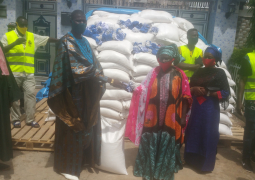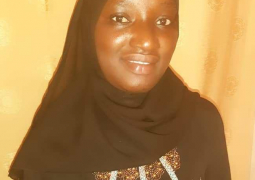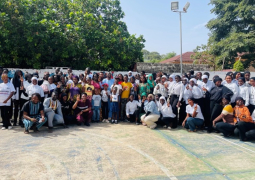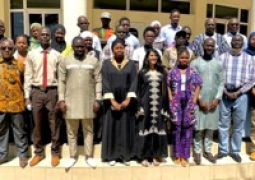
Ousman Ceesay, who has been living with Type 1 diabetes since 2011, made this disclosure in a recent interview with The Point.
Ceesay’s stamina and perseverance enabled him to transform his personal struggles into a mission to educate, inspire, and advocate for better, healthier lifestyle and support for people living with diabetes in The Gambia.
Despite the challenges of managing this lifelong and threatening condition, Ceesay maintained that diabetes doesn’t define him, but it’s his drive to create change that defines who he is.
Diagnosed with Type 1 diabetes at aged 10, Ousman recalled the early days as “terrible and overwhelming.”
Adjusting to constant blood sugar monitoring, dietary restrictions, and daily insulin injections was a significant challenge. “At first, I had no idea what diabetes was,” he explains. “It felt like my world had turned upside down, but with time, I learned to manage it.”
Ousman pays homage and all credits to his mother as his greatest source of strength and support, saying she was his lifeline, day maker, and his biggest advocate.
However, the lack of awareness and access to diabetes education made the initial years of managing the condition incredibly difficult. After falling into a week-long coma, Ousman realised the importance of understanding diabetes and advocating for better care.
Determined to make a difference, Ousman later joined the Young Gambian Diabetes Association, eventually becoming its president. Through his leadership, he has championed diabetes awareness campaigns, organised educational workshops, and advocated for accessible and affordable insulin.
“Living with diabetes is costly and demanding, but it’s also taught me resilience and purpose,” he says. “My goal is to ensure that no child or youth in The Gambia feels alone in this journey.”
Every year, YGDA commemorates World Diabetes Day on November 14th with activities such as free diabetes screenings, school visits, radio shows, and community clean-ups.
This year’s theme, “Diabetes and Well-Being,” underscored the need for holistic approach to manage diabetes effectively.
“Managing diabetes isn’t just about blood sugar levels,” Ousman explains. “It’s about mental, emotional, and social well-being too.”
One of the most pressing challenges Ousman highlights is the high cost of insulin and testing supplies. “In The Gambia, many families cannot afford insulin, and some are forced to ration it,” he says. “This is a life-threatening situation that requires immediate government and community intervention.”
Stigma and misinformation about diabetes also remain significant barriers. “People living with diabetes often face judgment and isolation,” he notes. “Education is the key to reducing stigma and empowering individuals to live fulfilling lives.”
Despite the obstacles, Ousman remains optimistic about the future.
“Diabetes doesn’t have to hold you back,” he encourages. “Eat healthy, exercise regularly, and educate yourself about your condition. Together, we can beat diabetes.”
As YGDA continues its advocacy efforts, Ousman calls on the government, philanthropists, and the community to support initiatives that provide free medications and better healthcare for those living with diabetes. “This is a fight for the well-being of our nation,” he asserts.
“Diabetes is not the end,” Ousman concludes. “It’s the beginning of a journey where we can inspire, educate, and build a stronger, healthier future.”





